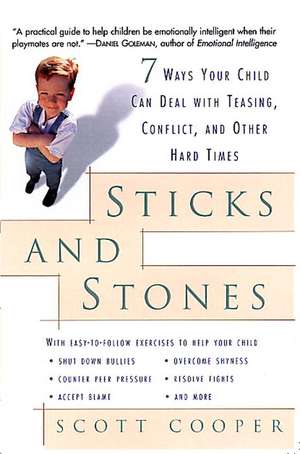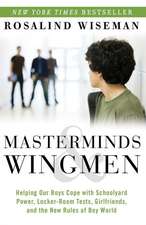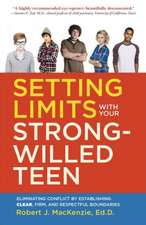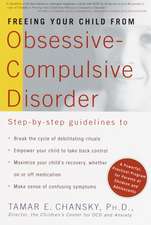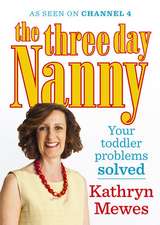Sticks and Stones: 7 Ways Your Child Can Deal with Teasing, Conflict, and Other Hard Times
Autor Scott Cooperen Limba Engleză Paperback – 31 ian 2000
This unique guide, beautifully illustrated with line drawings of each bird and informed by the author's gentle humor, will help kids be effective communicators and includes easy-to-follow exercises and sample scripts. Examples include:
Shut down bullies (The Way of the Blue Jay)
Overcome shyness (The Way of the Black Bird)
Counter peer pressure (The Way of the Hummingbird)
Resolve fights (The Way of the Dove)
Accept blame (The Way of the Crow)
And more
Preț: 94.06 lei
Nou
18.00€ • 18.72$ • 14.86£
Carte disponibilă
Livrare economică 24 martie-07 aprilie
Specificații
ISBN-10: 0812932404
Pagini: 208
Ilustrații: B+W LINE DRAWINGS THROUGHOUT
Dimensiuni: 140 x 208 x 13 mm
Greutate: 0.18 kg
Editura: HARMONY
Notă biografică
Extras
Within the same moment I could feel my heart sink and my anger surge. Here was my seven-year-old son, his shoulders shaking and his big, brown eyes welling with tears, and he was looking up at me for help. My easygoing, "perfect" son had just been picked on by a belligerent bully, and I wasn't going to stand for it. Somebody would have to pay.
Fortunately, as I marched out the front door, I became aware of what was happening inside me and I calmed down. Actually, the belligerent bully didn't look very belligerent at all. In fact, he looked a lot like my neighbor's "perfect" son. I dealt with the situation without losing it and found out that my son hadn't been quite so perfect in this case. As it turned out, my son's feelings had spilled over and he had responded to his teasing neighbor friend with hitting and pushing -- all natural little boy reactions. But the experience made me realize that I hadn't prepared my son to deal with these kinds of situations. For that matter, I hadn't taught him how to deal with hardly any kind of difficult social situation.
I began to realize in that moment that all of us carry around an internal toolbox. In that toolbox are all the tools we own for dealing with every sort of situation, confrontation, and human contact. If all I find in my toolbox when you threaten me is a hammer, I'll pound you with it. But if I also carry around lighter, more subtle tools, I'll have them available to try first. Kids need such tools, not just to deal with other kids but for the even bigger dilemma of dealing with adults -- how do you tell an unkind or unfair adult to cut it out?
I decided that my son needed more than a hammer. Besides being his father, I had the background to give him something more. I had been blessed with a father who cared authentically about young people and dedicated his life to training them. As a high school agriculture teacher in the heart of the Napa Valley, he had taken many students (less academically inclined in some cases) and helped them hone their practical skills through on-the-job projects. Some of these young men would go on to become highly regarded practitioners in the wine industry. Maybe because of my father's influence, I had spent a lot of my own adult life interested and involved in youth development efforts. Initially I had been a bilingual aide, teacher, and coach. After I obtained an MBA and entered the business world, I maintained a strong connection with youth development by coaching and participating on school and drug prevention boards. Through the years I had researched and developed a few of my own tools to help kids in the areas of self-esteem, assertiveness, and conflict resolution -- all areas that related to the tools I wanted my son to have. I had experimented in teaching these principles to teenagers and had a sense of what worked and what didn't. Additionally, the business world had increased my awareness (if not enjoyment) of real-world confrontation and negotiation and the strategies for dealing with tough social situations.
Kids also need the skills to deal with us, their own parents, especially when, too distracted by the daily hustle and bustle, we forget to be kind and reasonable.
Failing in my search for a good one-stop resource that I could use to teach my son the tools I wanted him to have, I began to pull together my own past research and experience, and the experience of my wife, Julie, in a form that I could use to teach our three children. After trial and error, I arrived at a way of giving our children a set of useful verbal tools that could help them deal with a wide range of difficult social situations. My hope is that you won't have to go through the same long process to find these helpful tools.
As parents we know that the childhood saying about sticks and stones isn't always true. Sticks and stones certainly hurt and so can names and words. The main point of Sticks and Stones is to give your children the verbal tools to counter the hurtful words others tell them and that they tell themselves. My own children have used some of the approaches in this book to deal with criticism, teasing, ridicule, coercion, and conflict.
These skills are a kind of verbal judo -- a term that has been used by others, most prominently George Thompson, to refer to verbal techniques that can help us deal with difficult social situations. Of all the schools of martial arts, judo is perhaps the most assertive without being overtly aggressive. The techniques of judo are relatively gentle in the sense that they are directed toward deflecting or controlling an attack. Students don't attempt to strike with punches, kicks, or other offensive moves but rather apply throwing and grappling moves in order to use an attacker's force to their own advantage. Similarly, verbal judo isn't meant to be used to lash out and attack others aggressively but rather to respond assertively to their verbal blows.
One of the strengths of martial arts training is that students learn very clear and specific techniques. With one little step at a time, they develop a repertoire of moves that they can ultimately use in any combination they need. My techniques work the same way. By practicing and mastering them one step at a time, your children can become better equipped to deal with difficult social situations as they arise in everyday living.
Kids have always faced these tough situations. But with the current pattern of family and work life, parents frequently aren't around to provide support (it's been estimated that as of 1986, parents had ten to twelve hours less time each week to spend with their children than in 1960). Children need to have skills to fend for themselves when we're not there. They also need the skills to deal with us, their own parents, especially when, too distracted by the daily hustle and bustle, we forget to be kind and reasonable.
Recenzii
--Daniel Goleman, author of Emotional Intelligence
"A wonderful, fresh new addition to the field of parent education. Creative, insightful, respectful, and practical in his approach, Scott Cooper creates colorful images that make the steps to effective communication easy to remember and follow."
--Mary Sheedy Kurcinka, author of Raising Your Spirited Child
"Scott Cooper gives parents ample doses of practical, easy-to-follow recipes to help children cope with relationship crises and change negative self-talk. I highly recommend his common-sense approaches to fostering a sense of well-being and strength of character."
--Barbara C. Unell, author of Discipline Without Spanking or Shouting
Textul de pe ultima copertă
"Hey, Shorty, what's your problem?" "Everyone will think you're stupid if you don't come". "You wanna fight me on that?" Every parent knows the truth: Sticks and stones certainly hurt, and so can names and words. Unfortunately, criticism, teasing, ridicule, coercion, and conflict are an inevitable part of every child's life. This unique book will help you give your children the verbal tools to counter the hurtful words others tell them -- and that they tell themselves. Each chapter, based on the characteristics of a particular bird, uses a wealth of examples, sample scripts, and imaginative, easy-to-follow exercises to give kids the confidence to speak up for themselves more assertively, yet gently and effectively. Help your child learn how to:
-- resist peer pressure (the Way of the Blue Jay)
-- accept blame (the Way of the Crow)
-- shut down bullies (the Way of the Hummingbird)
-- resolve conflicts (the Way of the Dove)
-- overcome shyness (the Way of the Blackbird)
-- talk back to self-defeating thoughts (the Way of the Owl)
-- live more mindfully (the Way of the Hawk)
